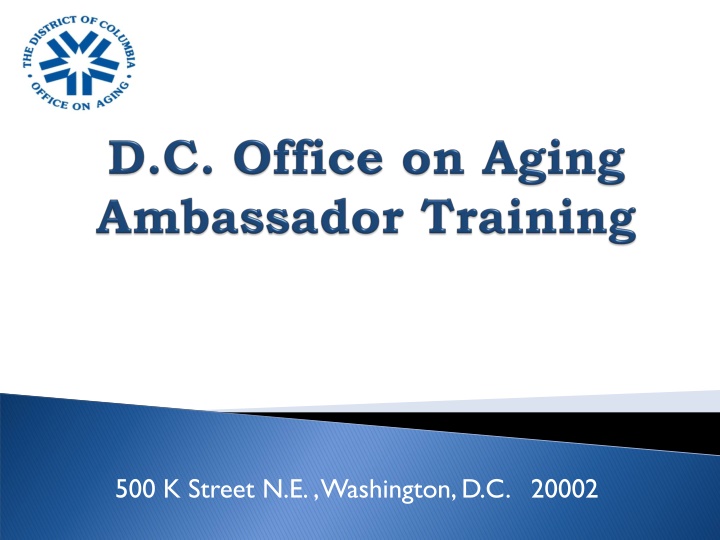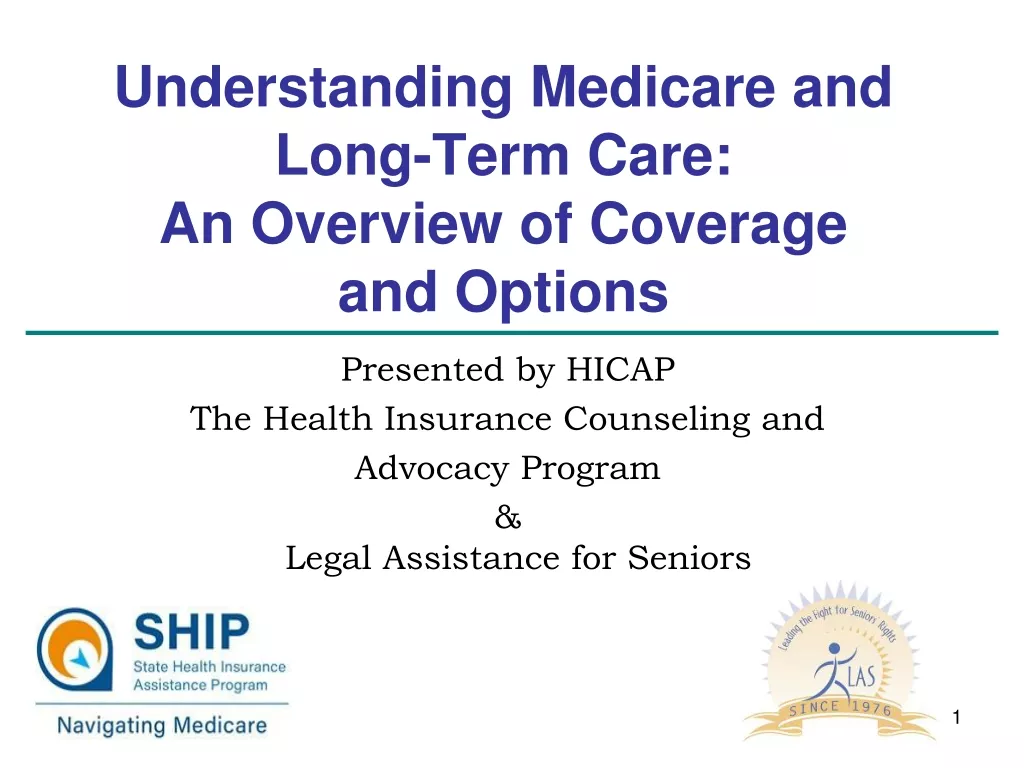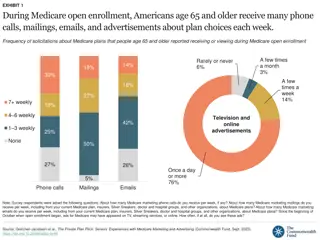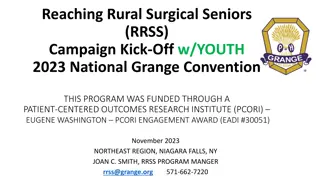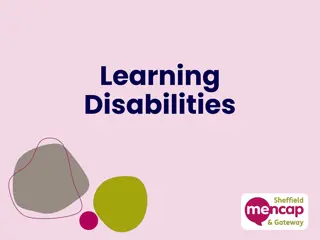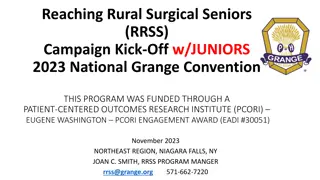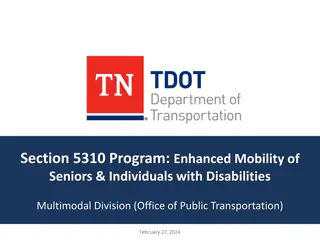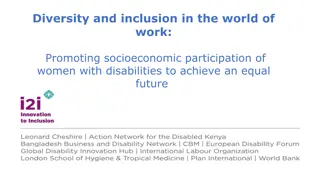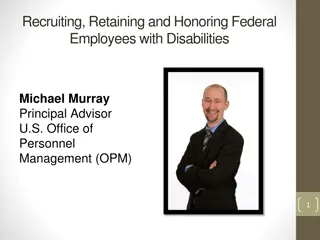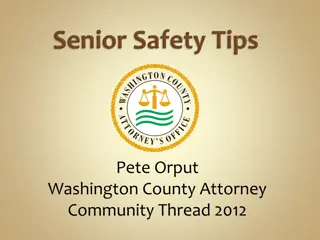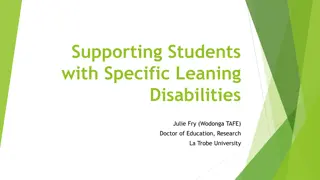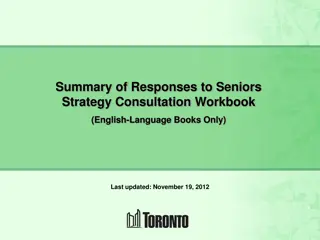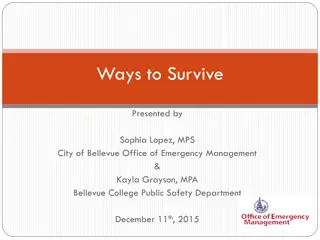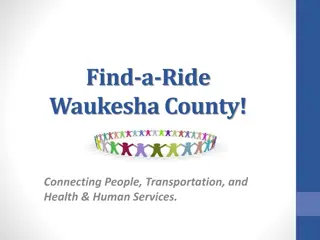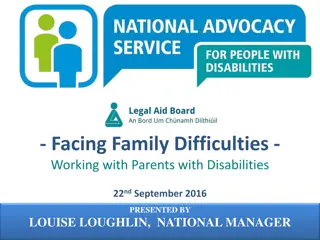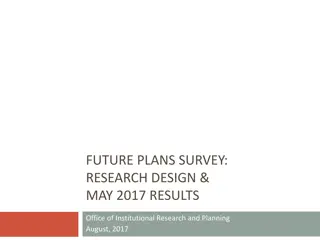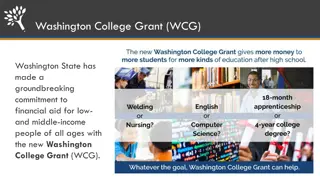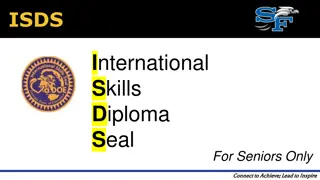Enhancing Community Services for Seniors and Individuals with Disabilities in Washington, D.C.
This initiative by the D.C. Office on Aging focuses on training community residents to amplify awareness about programs and services available for seniors, individuals with disabilities, and caregivers. Established in 1975, the DCOA advocates for longevity, independence, and dignity through various health, education, employment, and social service programs. The Senior Service Network, comprising over 20 nonprofit organizations, offers a range of services tailored to older District residents and people with disabilities. Roughly 16.3% of the District's population comprises individuals aged 60 and above, highlighting the need for dedicated support and resources.
Download Presentation

Please find below an Image/Link to download the presentation.
The content on the website is provided AS IS for your information and personal use only. It may not be sold, licensed, or shared on other websites without obtaining consent from the author.If you encounter any issues during the download, it is possible that the publisher has removed the file from their server.
You are allowed to download the files provided on this website for personal or commercial use, subject to the condition that they are used lawfully. All files are the property of their respective owners.
The content on the website is provided AS IS for your information and personal use only. It may not be sold, licensed, or shared on other websites without obtaining consent from the author.
E N D
Presentation Transcript
This is an initiative to train community residents about the programs and services offered by the DC Office on Aging and its Senior Service Network. The ambassadors serve as points of contact for distributing information in their wards and communities about the programs and services available to seniors, persons living with disabilities, and caregivers. 2
The D.C. Office on Agings mission is to advocate, plan, implement, and monitor programs in health, education, employment, and social services which promote longevity, independence, dignity, and choice for: District residents age 60 and over; People with disabilities age 18 and older; and their caregivers. 3
DCOA was established by the Mayor in 1975 in order to plan, develop, and implement programs and services for residents age 60 and older. In 2008 DCOA expanded its scope to include services for people ages 18 and over living with disabilities. DCOA operates the Aging and Disability Resource Center (ADRC) and funds the Senior Service Network, which together consist of more than 20 community-based nonprofit organizations, operating more than 40 programs for older District residents (age 60 and older), people with disabilities (age 18-59), and their caregivers. 4
Roughly 107,117* District residents are age 60 or over, which makes up 16.3% of the total District population. WARD NUMBER** PERCENTAGE** 1 9,441 8.8% 2 11,058 10.3% 3 17,581 16.3% 4 16,771 15.6% 5 15,204 14.1% 6 13,848 12.9% 7 14,200 13.2% 8 9,589 8.9% *Based on Census American Community Survey using 2014 data. **Source: District of Columbia Office of Planning/State Data Center, September 8, 2015 5
DCOAs Senior Service Network consists of more than 20 community-based nonprofit organizations funded by DCOA, thus grantees that operate more than 40 programs for senior citizens, people with disabilities, and their caregivers. The ADRC works closely with DCOA grantees, including referral, case collaboration, and professional development. Eligibility requirements apply to many of the following services, and are offered at no cost to the D.C. resident, for a fee, on a sliding scale, or with a voluntary contribution. 6
Services include, but are not limited to: In-Home Support Legal Services Long-Term Care Ombudsman Nursing Homes Nutrition Counseling Recreation and Socialization Respite Aid Services for Caregivers Transportation Senior Wellness Centers Adult Day Health Caregiver Supportive Services Case Management Community Dining Counseling Emergency Shelter Fitness and Wellness Health Insurance Counseling Home-delivered Meals 7
Lead agencies are DCOA grantees within the Senior Service Network that provide core social and health services in each ward. Lead Agencies are responsible for delivering the following core supports to older adults in each service area: Community Dining & Home Delivered Meals Caregiver Respite/Suppl. Services Case Management Comprehensive Assessment Counseling Health Promotion Nutrition Counseling & Education Socialization Coordinate transportation 8
There is one lead agency in each ward: Ward 1: TERRIFIC, Inc. Ward 2: TERRIFIC, Inc. Ward 3: IONA Senior Services Ward 4: TERRIFIC Inc. Ward 5: Seabury Ward 5 Aging Services Ward 6: Seabury Ward 6 Aging Services Ward 7: East River Family Strengthening Collaborative Ward 8: East River Family Strengthening Collaborative 9
Senior Wellness Centers (SWCs) provide programs that promote the health and wellness of residents 60 years and older, and serves a nutritious mid-day meal with a salad bar. SWCs offer health education and exercise classes, such as: Health promotion and disease prevention classes Healthy cooking demonstrations Group Tai Chi They also have social and recreational programs, such as: Quilting and sewing classes Group trips 10
DCOAs Meal Program promotes socialization and nutrition, and reduces hunger and food insecurity. Community Dining (Congregate Meal) Program meals in group settings such as senior wellness centers, senior housing buildings, and recreation centers. Home-delivered Meal Program meals delivered to seniors who are frail, homebound, or otherwise isolated. 11
Lead agencies operate 50 community dining sites across the city. Location of Congregate Meal Sites DCOA Senior Wellness Center Dept. Park & Rec. 6 3 Sites work directly with the lead agency in their Ward to: Safely serve the meals each day; and Organize at least 2 daily activities that include recreation and/or health education. Faith-Based 13 Public Housing 6 Senior Center 5 Senior Housing 17 TOTAL 50 12
Home-delivered Meals are offered to seniors who are frail, homebound, or otherwise isolated. DCOA provides two options for home-delivered meals to all wards in the city. Option 1: Customer receives up to four deliveries a week and up to seven meals a week. Each delivery consists of fresh meals to be consumed within 48-hours of a delivery. Option 2: Customers receive one delivery with up to 14 meals every two weeks. Each delivery consists of prepackaged meals to last up to 14-days in the refrigerator and must be reheated in the microwave before eating. 13
DCOA also connects eligible seniors to additional or alternative food sources: o Grocery Plus (Commodity Supplemental Food Program): free monthly bag of groceries. o Senior Farmers Market Program: seniors already enrolled in Grocery Plus receive $30 in vouchers for fresh fruits and vegetables at participating farmers markets. o SNAP (Food Stamps): monthly financial assistance to purchase groceries. o Produce Plus: seniors already enrolled in a government benefit program receive weekly $10 vouchers to purchase fresh fruits and vegetables at participating farmers markets. 14
Seabury Connector (formally Washington Elderly HandicappedTransportation Service or WEHTS), operated by Seabury Resources for the Aging (Seabury), provides specialized curb-to-curb services to District residents age 60 and older. Primary objective: provide life-sustaining medical transportation to low-income, functionally impaired persons to achieve and maintain maximum function and independence in the community. 15
Transportation services are provided for: Essential medical appointments chemotherapy, dialysis, adult day health care, etc. Delivery of home-delivered meals only for the frail Home-delivered Meal Program Sites and activities Senior Wellness Centers, group activities, special events, etc. Alternative transportation services include: ConnectorCard any mode of transportation Transportation referral and information 16
ConnectorCard is a DCOA subsidized debit card that is loaded with up to $100 per month for each participating senior who shares the burden of costs. Replaces the Call-N-Ride paper coupon system. Up to 150 former paper coupon riders are eligible for this service. ConnectorCard can be used on any public or private mode of transportation that accepts a card as a form of payment. Seabury staff monitor daily activity and usage. Referral and information to other transportation services may include: MetroAcess, TransportDC, and Dept. Parks and Recreation. 17
Since 1976, DCOA has contracted with Home Care Partners to administer mandatory homemaker services and caregiver support/respite as defined under two articles of the Older Americans Act (OAA): Title III B Support Service and Senior Center Program: funding contributes to home health and homemaker services (e.g. Home Health Aides). Title III E National Family Caregiver Support Program: funding contributes to respite services to caregivers (e.g. education, spring cleaning, etc.). 18
Home Health Aides assist with tasks that help customers manage their daily routines. Based on a personalized plan of care, aides are assigned to help with duties that may include: bathing dressing grooming feeding toileting medication reminders range of motion exercises preparing and serving meals light house cleaning laundry shopping and errands escort to appointments companionship Customer Eligibility: District residents 60 years and over, and Not eligible for Medicaid. 19
Services are designed to ease some of the stresses untrained family caregivers experience while providing continued care at home. Services include: Case Management to help develop a caregiving plan; In-home training to manage health problems faced by the senior; Telephone support groups; Seminars on practical topics such as therapeutic activities, fall prevention, nutrition and blood pressure management; Once-a-year Spring Cleaning for the senior s home; and Reimbursements for eligible caregiving-related supplies or respite care by an agency or other family members. Customer Eligibility: District residents that are unpaid primary caregivers to District residents 60 years and over. 20
DCOAs Aging and Disability Resource Center (ADRC), provides a coordinated system of information and access for individuals seeking long-term care services and supports. This is accomplished through the provision of information, counseling, and service access to older adults, individuals living with disabilities, and caregivers. 21
2005: DC receives its first federal ADRC grant and is initially run by the Department of Health (DOH). 2008: ADRC is transferred to DCOA. 2013: Department for Health Care Finance (DHCF) begins funding DCOA to assist with Elderly and Persons with Disabilities (EPD) Waiver enrollment: additional social worker, information & referral/assistance staff and supervisors hired. 2014: Money Follows the Person (MFP) staff are transferred from DHCF to DCOA. 2015: DHCF provides additional funding for expanding ADRC role in Medicaid enrollment. 22
ADRC provides a variety of direct services including: Medicaid Waiver Enrollment Medicaid Adult Day Health Enrollment Information and Referral/Assistance Community Social Work Community Transition 23
D.C.s Elderly and Persons with Physical Disabilities (EPD)Waiver Program is a person-centered home and community-based waiver funded by Medicaid and administered by the Department of Health Care Finance (DHCF). As of Spring 2015, the ADRC expanded its role in the EPD Waiver and Medicaid-funded Adult Day Health enrollment processes with the goals of: Reducing confusion about the enrollment process Increasing inter-agency communication Improving customer service Decreasing enrollment wait times 24
At the time of conception, the MES team was 80% mobile, providing home visits to all EPD waiver applicants In April 2017, the ADRC began offering 3 additional pathways to enrollment: self-service, office visits, and phone consultations To date, the MES team has submitted over 1,900 waiver applications to the Economic Security Administration (ESA) Since 2015 application processing times have reduced from 200+ days to 60 days or less DHCF and the ADRC MES team was awarded the 2017 16th Annual Cafritz Award for Team Innovation 25
DCOA has worked collaboratively with DHCF to develop an Adult Day Health Program (ADHP) enrollment process for Medicaid State Plan beneficiaries. ADRC Community Social Workers: Conduct Person-Centered Interviews, informing beneficiaries of their service and provider choices. Complete Person-Centered plans to ensure timely enrollment. Work collaboratively with DHCF, DDS, and other community partners to educate stakeholders (DC residents, caregivers, ADHP directors and staff) about the new process. 26
ADRCs Information and Referral/Assistance (I&R/A) Unit provides a point of entry into the senior service and disability networks. Clients and caregivers can call and email to obtain assistance on accessing a wide range of home and community-based services, long-term care options, and public benefits. Contact: 202-724-5626 or ask.adrc@dc.gov 27
ADRC Social Workers provide: Long-term care options counseling (person-centered conversations about home and community-based service options); Case management, counseling, advice and referral- giving for adults 18-59 years old; and Collaborative assistance on cases with other D.C. agencies, and/or community-based organizations. 28
The Community Transition Team assists with transitioning older adults and people with disabilities from long-term care settings back to the community. It also provides comprehensive post-discharge case management services for up to one year after the date of discharge to ensure sustained independence and quality of life. 29
General Intake: 202-724-5626 or ask.adrc@dc.gov Referrals for Elderly and Persons with Physical Disabilities Waiver Enrollment: 202-724-5626 or epdwaiver.dcoa@dc.gov Address: 500 K Street NE, DC 20002 ADRC Managers: adrc.managers@dc.gov 30
Age-Friendly DC is a coordinated, comprehensive and collective-action effort with goal of ensuring all DC residents are active, connected, healthy, engaged and happy in their environment. It is an overarching policy and community engagement framework, one that involves every aspect of life, from transportation, to housing, to health, to finances. The District completed the Age-Friendly D.C. Strategic Plan in December 2014, which presented two (2) years of engaging nearly 4,000 residents through community forums, focus groups, surveys, and neighborhood walks. 31
In October 2014, D.C. received grant from the Administration for Community Living (ACL) to develop a three-year plan to transform current Long-Term Supports and Services (LTSS) programs and processes in the District into a single, No Wrong Door system for all populations and all payers. The goal is to create a coordinated District-wide, No Wrong Door system that will support all D.C. residents in need of LTSS, regardless of where they enter the system. Key Partners Office on Aging Department of Disability Services Department of Health Care Finance Department of Behavioral Health Department of Human Services Department of Health Office of Veterans Affairs 32
DCOA works with federal partners to develop strategic objectives and initiatives that serve as a multi-year blue print for serving the older adult population in the District. The District of Columbia State Plan on Aging has four (4) goals for 2017 through 2018: Strengthen core program operations and service coordination; Promote awareness and access to long-term care services and supports offered in the District; Promote aging in place with dignity and respect; and Ensure the agency is driven by customer experience. 33
Currently, DCOA is working on: Ambassador Training Intergenerational Programming Money Smart for Older Adults Safe at Home Senior Villages 34
The District of Columbia Office on Aging Safe at Home program provides preventative adaptations to reduce the risk of falls in the homes of qualifying seniors and adults with disabilities. The program has expanded to include safety outside the home through home security cameras at no cost. In-home preventative adaptations that may be provided through Safe at Home include: Handrails, Grab bars Bathtub cuts Shower seat Furniture risers Chair lift Call 202-724-5626 for more information on how you can apply for the Safe at Home Program. 35
DCOA partnered with D.C. Public Schools to bring together older adults and early childhood students to work together on learning experiences in the classroom. Seniors read to students, provide one-on-one tutorials and facilitate special activities. Genesis, DC s first intentional intergenerational community, DCOA developed in partnership with DC Child and Family Services Comprised of 27 units of affordable housing for residents from three primary groups: (1) young mothers transitioning from the District of Columbia foster care system and their children, (2) active, service-minded seniors, and (3) other families that are not connected with the foster care system. 36
DCOA and the Elder Abuse Prevention Committee work together to implement the Money Smart for Older Adults, a consumer education program in collaboration with the U.S. Consumer Financial Protection Bureau (CFPB). This interactive consumer education module, designed to prevent the financial exploitation of seniors, has been presented to over a thousand older adults throughout District of Columbia, including seniors at DCOA s six (6) senior wellness centers. 37
During FY15, DCOA worked with leading experts to provide assistance to new and emerging villages, and to research what DCOA s role should be in supporting villages. D.C. Villages identified three major areas where DCOA can play an important supporting role: Increasing Awareness: promote connections between agencies goals and the work of the Villages. Leverage Partnerships: convene and connect a variety of stakeholders to define mutual goals and efficiently leverage resources. Build Capacity: build local leadership through assistance, training, and other connections to local funders and community resources. 38
Spotlight on Aging in The Beacon Newspaper Spotlight on Community Living in The Current Newspaper "Director's Message" Washington Informer Senior Zone on WYCB, 1340AM DCOA E*News Social Media: DCAgingNews on Facebook, Twitter, and Instagram 39
